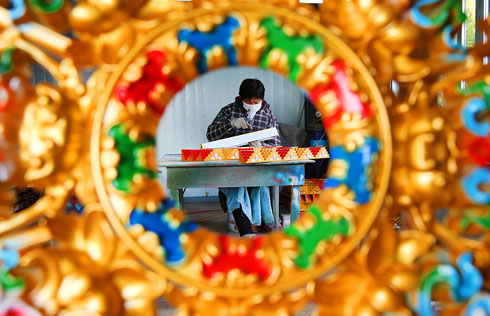US' ill-judged move dims prospects for DPRK talks
Despite his war of words with the leader of the Democratic People's Republic of Korea Kim Jong-un, US President Donald Trump expressed his preference for a diplomatic solution to the Korean Peninsula nuclear crisis during his recent trip to Asia.
Yet in a move that seems to go directly against this professed intention, Trump put the DPRK back on the United States' terrorism blacklist on Monday.
The designation of the DPRK as a state sponsor of terrorism will only further alienate the country. It makes the prospects for talks much dimmer, and may even eliminate the possibility of any talks.
The move comes at a time when the Korean Peninsula had become calmer. For more than two months, Pyongyang has refrained from conducting any missile and nuclear tests.
The US' designation of the DPRK as a state sponsor of terrorism could lay waste to the efforts of China and Russia to bring the DPRK back to the negotiation table. Instead, it could be used by Pyongyang as a pretext to renew its weapons tests, thus restarting the vicious circle of escalating tensions on the peninsula that had seemed in danger of spiraling out of control.
Besides whether the DPRK meets the legal requirements for being relisted as a state sponsor of terrorism is questionable, even at the US State Department. Trump has based the designation on the alleged killing of Kim's half brother Kim Jong-nam by DPRK agents at Kuala Lumpur airport in February. But even if this proves to be the case, lawyers say there has to be more than one terrorist incident to substantiate the claim.
The designation seems more like an excuse for the US to seek the highest level of sanctions against Pyongyang as part of its proclaimed "maximum pressure campaign".
But the DPRK has already been under crushing sanctions imposed by the United Nations and other countries, which restrict its oil imports and ban most of its exports, aimed at depriving it of funds for its nuclear and missile programs. It takes time for such sanctions to bite, there is no evidence that further sanctions will achieve more immediate results in constraining Pyongyang's nuclear ambitions. Even US Secretary of State Rex Tillerson admitted the designation is a "very symbolic move" and their "practical effects may be limited".
The DPRK has justified its pursuit of nuclear weapons with its existential concerns, insisting the weapons will help it better defend itself from the threat of a US invasion. The latest US move only serves to fan that fear — given what happened to Iraq and Libya — and does a disservice to easing the already tense situation on the peninsula. Instead, as China said on Tuesday, "more should be done" to resolve the crisis through dialogue.













